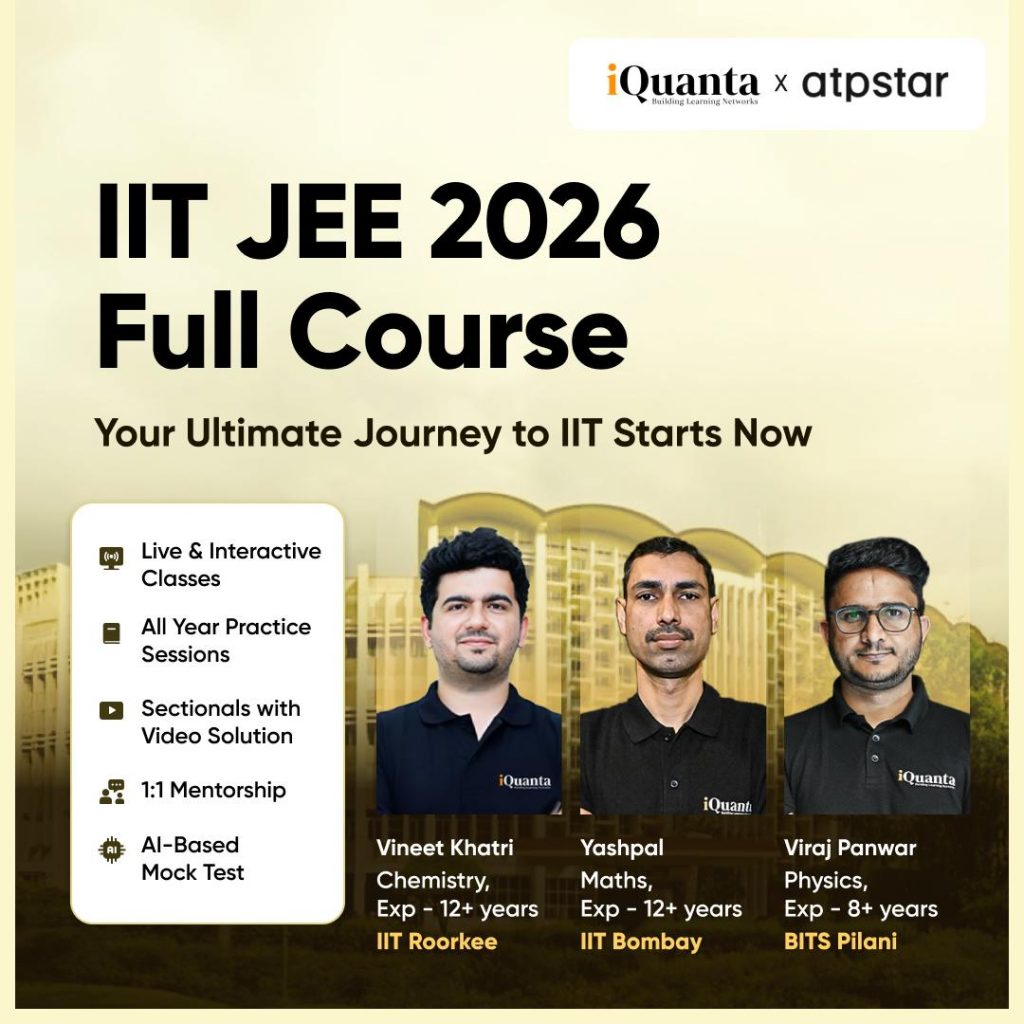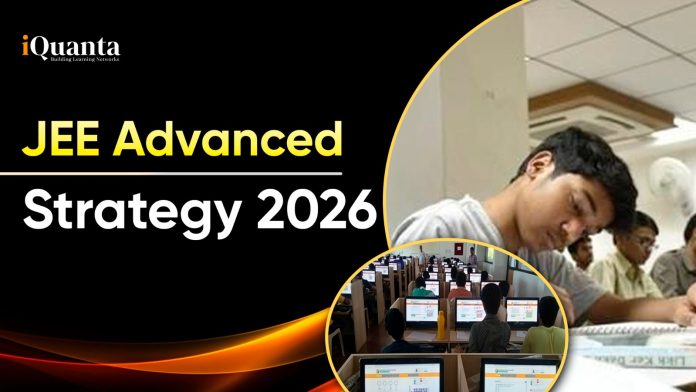JEE Advanced 2026 is not just an entrance exam and it is the ultimate challenge for engineering aspirants who are aiming for prestigious IITs. Regarded as one of the toughest exams in the country, JEE Advanced tests not only your conceptual understanding but also your analytical thinking and problem-solving speed. Clearing it opens a gateway to world-class education, exceptional peer networks, and career opportunities.
A well prepared JEE Advanced strategy is important to stand out in the highly competitive exam. It begins with identifying your strengths and weaknesses across Chemistry, Mathematics and Physics that is followed by the regular mock tests and in-depth analysis of the previous year papers. So staying consistent, seeking guidance when required and it is maintaining a proper routine that is equally important for the winning strategy.

Join this free JEE Prep Group to Get Free Study Material, Preparation Strategy by Toppers, Latest Updates and More!
JEE Advanced 2026- An Overview
| Feature | Details |
| Eligibility | Based on top scores in JEE Main 2026 (top 2.5 lakh candidates approx.) |
| Exam Sessions | Likely to be held in May 2026 (Single session) |
| Mode of Exam | Online (Computer-Based Test) for both Paper 1 and Paper 2 |
| Duration | 3 hours each for Paper 1 and Paper 2 |
| Number of Papers | 2 (Paper 1 & Paper 2) – both compulsory |
| Subjects Covered | Physics, Chemistry, Mathematics |
| Question Types | MCQs, Numerical Value Questions, and Matching-type/Matrix-based Questions |
| Marking Scheme | Varies per section; may include partial, full, or negative marking |
| Language | English & Hindi |
| Shifts | Typically conducted in 2 shifts: Morning and Afternoon (timing TBA) |
| Purpose | Admission into 23 IITs and qualifying criteria for other advanced programs |
JEE Advanced 2026 Exam Dates and Important Events
| Event | Expected Date |
| Release of JEE Advanced 2026 Notification | March 2026 |
| Online Registration Begins | First week of April 2026 |
| Last Date to Apply | Second or third week of April 2026 |
| Last Date for Fee Payment | Third week of April 2026 |
| Admit Card Release | First or second week of May 2026 |
| JEE Advanced 2026 Exam Date | Mid to Late May 2026 (Sunday) |
| Release of Provisional Answer Key | Last week of May 2026 |
| Objection Window for Answer Key | Last week of May 2026 |
| Final Answer Key & Result Declaration | First week of June 2026 |
| Start of JoSAA Counselling | Second week of June 2026 onwards |
JEE Advanced 2026 Application Process & Key Deadlines
Step-by-Step Application Process
| Step | Action | Details |
| Step 1 | Online Registration | Visit jeeadv.ac.in, log in with JEE Main 2026 credentials, and generate a registration ID |
| Step 2 | Fill Application Form | Enter personal, academic, and exam city preferences; upload required documents |
| Step 3 | Upload Documents | Photograph, Signature, Category Certificate, PwD Certificate (if applicable) |
| Step 4 | Pay Application Fee | Pay using Debit/Credit Card, UPI, or Net Banking |
| Step 5 | Download Confirmation | Save confirmation page after successful submission |
| Step 6 | Correction Window (if available) | Make edits to personal details/documents if the correction window opens |
Application Fee Details
| Category | Fee (Indian Centres) | Fee (Foreign Centres) |
| General / OBC – Male | ₹ 3200 | US $100 |
| General / OBC – Female | ₹ 1600 | US $100 |
| SC / ST / PwD | ₹ 1600 | US $100 |
Key Deadlines (Tentative)
| Event | Expected Timeline |
| Notification Release | March 2026 |
| Registration Start Date | 1st week of April 2026 |
| Registration End Date | 2nd or 3rd week of April 2026 |
| Last Date for Fee Payment | 3rd week of April 2026 |
| Correction Window (if applicable) | Last week of April 2026 |
| Admit Card Release | 1st or 2nd week of May 2026 |
| JEE Advanced 2026 Exam Date | Mid to Late May 2026 |

Join this free JEE Prep Group to Get Free Study Material, Preparation Strategy by Toppers, Latest Updates and More!
JEE Advanced 2026 Admit Card & Exam Day Guidelines
| Category | Details |
| Admit Card Release | Available 10–15 days before the exam on jeeadv.ac.in |
| Download Requirements | Use JEE Advanced registration number, DOB & mobile/email to log in |
| Admit Card Includes | Exam center, date, time, reporting instructions, and candidate details |
| Required Documents | Admit Card + Valid Photo ID (Aadhaar, Passport, Voter ID, School ID, etc.) |
| Reporting Time | Reach the center at least 60 minutes before the scheduled time |
| Prohibited Items | No mobile phones, calculators, watches, study material, or electronic gadgets |
| Other Guidelines | Follow COVID-19 or updated safety protocols issued by authorities |
JEE Advanced 2026 Result & What Comes Next
| Event | Details |
| Result Declaration | Expected in 1st week of June 2026 on jeeadv.ac.in |
| Result Details | Includes Total Score, AIR, and Category Rank |
| Next Steps if Qualified | Register for JoSAA Counselling for IIT admission |
| Not Appearing for JoSAA? | You may apply separately to other institutes (IISERs, IIST, etc.) if eligible |
| Backup Plan | Explore top NITs/IIITs through your best JEE Main score if applicable |
JEE Advanced 2026 Exam Pattern & Marking Scheme
Understanding the JEE Advanced 2026 exam pattern is important for strategic preparation. Unlike JEE Main, JEE Advanced has a dynamic pattern which is crucial every year, testing a deeper understanding of Physics, Chemistry, and mathematics. The questions are designed to assess analytical skills, logical reasoning and multi-concept application.
JEE Advanced 2026 – General Paper Pattern (Expected)
| Paper | Subjects Covered | Duration | Mode |
| Paper 1 | Physics, Chemistry, Maths | 3 Hours | Computer-Based Test (CBT) |
| Paper 2 | Physics, Chemistry, Maths | 3 Hours | Computer-Based Test (CBT) |
| Both Papers | Compulsory for all aspirants | 6 Hours total | Held in 2 shifts (same day) |
Question Types in JEE Advanced 2026
| Type of Questions | Features |
| Multiple Choice Questions (MCQs) | May have one or more correct options |
| Numerical Value Questions | Solve and enter numeric answers (no options provided) |
| Match the Following / Matrix Type | Matching elements from two sets |
| Assertion-Reason / Paragraph-Based | Appears occasionally in mixed-concept format |
Marking Scheme (Expected – Varies by Section)
| Response Type | Marks Awarded |
| Correct Answer | +3 or +4 marks (depending on section) |
| Incorrect Answer (MCQ) | -1 or -2 marks (negative marking applies) |
| Incorrect (Numerical/Matrix) | Usually no negative marking |
| Unattempted | 0 marks |
JEE Advanced 2026 Syllabus & High-Weightage Topics
Physics
| Unit | High-Weightage Topics |
| Mechanics | Rotational Motion, Work, Power & Energy, Newton’s Laws |
| Electrodynamics | Current Electricity, Electrostatics, Capacitors |
| Thermodynamics & Heat | Laws of Thermodynamics, Heat Transfer |
| Optics | Ray & Wave Optics, Interference, Diffraction |
| Modern Physics | Photoelectric Effect, Atomic Structure, Nuclear Physics |
Chemistry
| Branch | High-Weightage Topics |
| Physical Chemistry | Chemical Kinetics, Thermodynamics, Electrochemistry, Ionic Equilibrium |
| Inorganic Chemistry | Coordination Compounds, Chemical Bonding, P-Block Elements |
| Organic Chemistry | Named Reactions, Reaction Mechanism, Aldehydes & Ketones, Alcohols & Amines |
Mathematics
| Unit | High-Weightage Topics |
| Algebra | Complex Numbers, Matrices & Determinants, Probability, Binomial Theorem |
| Calculus | Limits, Continuity & Differentiability, Integration, Differential Equations |
| Coordinate Geometry | Parabola, Circle, Straight Lines, Ellipse |
| Vectors & 3D Geometry | Vector Algebra, 3D Planes & Lines |
| Trigonometry | Inverse Trigonometric Functions, Trigonometric Equations |
Subject-wise JEE Advanced Strategy
| Subject | Key Topics | Recommended Books | Strategy Tips |
| Physics | Mechanics, Electricity & Magnetism, Optics, Modern Physics | – H.C. Verma (Vol 1 & 2) – D.C. Pandey Series – I.E. Irodov (Selective) | – Focus on concept clarity before attempting problems – Practice numerical-based problems daily – Solve previous year papers with time tracking |
| Chemistry | Organic, Inorganic, Physical Chemistry | – O.P. Tandon -Morrison & Boyd (Organic) – N Awasthi (Physical) – NCERT (Inorganic – must) | – Inorganic: Revise NCERT thoroughly – Organic: Understand mechanisms – Physical: Practice numericals & formulas regularly |
| Mathematics | Algebra, Calculus, Coordinate Geometry, Vectors & 3D | – I.A. Maron (Calculus) – Cengage / Arihant Series – A Das Gupta | – Break down problems into steps – Practice advanced problems – Focus on accuracy and speed simultaneously |
Mistakes to Avoid in JEE Advanced Strategy
There are some mistakes that we should avoid while making your JEE Advanced strategy
- It is important to analyze your errors while giving tests, solving DPPs and more.
- Don’t over relying on one source of study, rather practice advanced questions from multiple sources.
- It is important to attend all the practice sessions on time.
- Skipping revision for any subject is a big mistake.
How to Prepare for JEE Advanced 2026?
- Understand the exam pattern and syllabus thoroughly
- Know the structure: 2 compulsory papers, 3 hours each
- Practice question types: MCQs, numerical value, paragraph-based, and match the column.
- Master all NCERT topics and cover the JEE Advanced- specific syllabus released by IIT.
- Create a Realistic, Subject- Wise Study Plan
- Break your 9-10 months into foundation, practice and revision phases
- Allocate daily slots for Physics, Chemistry and Mathematics.
- Balance concept building (60%) and problem- solving (40%) in each session.
- Use the Right Study Materials
- Start with the NCERT for all subjects
- Refer to IIT level books like:
- HC Verma (Physics)
- OP Tandon or RC Mukherjee (Chemistry)
- Cengage or Arhiant Series (Maths)
- Solve IIT JEE Advanced Previous Year Papers (last 10 years).
- Focus on High-Weightage and Conceptual Topics
- Physics: Electrodynamics, mechanics
- Chemistry: Organic Reactions, Thermodynamics
- Maths: Calculus, Vectors, 3D Geometry
- Attempt Mock Tests and Analyze Performance
- Take full-length JEE Advanced mock tests under timed conditions every 2-3 weeks
- Do detailed error analysis: Note where you went wrong and revise accordingly
- Simulate the exact CBT format and practice across difficulty levels.
Why Choose iQuanta × ATP Star IIT JEE 2026 Full Course?
Key Highlights
| Feature | Details |
| Course Validity | Access till April 2026 – full support throughout your JEE journey |
| Complete Syllabus Coverage | Covers Class 11 & 12, from foundation to advanced levels |
| Total Hours | 1000+ hours: Live classes + recordings + doubt sessions + mock tests |
| AI-Based Mocks | After each class, get AI-powered topic-wise tests for precision learning |
| Crash Course | 2-month revision booster after syllabus completion |
| Targeted Strategy | Designed to help aspirants achieve 99+ percentile |
What Makes It Unique
| USP | What It Means for You |
| Dual Pedagogy | Learn via Live Stream + Application Classes for deeper concept mastery |
| Top IITian & Kota Faculty | Get mentored by those who’ve produced top 100 rankers |
| AI Performance Analytics | Track your strengths, weak areas, and improvement zones in real-time |
| Proven Results | Backed by 99+ percentile scorers and successful IIT admissions |
Click Here to Enroll to JEE 2026 Course!

Conclusion: JEE Advanced Strategy
Success in the JEE Advanced exam is not just about studying hard for the exam, instead you have to study smartly. An effective JEE Advanced Strategy includes a deep understanding of concepts, problem-solving skills, and consistent revision. Start your preparation by mastering NCERT fundamentals to cover your basics and then move to advanced books like H.C. Verma for Physics, M.S. Chauhan for Organic Chemistry.
Another important part of your JEE Advanced Strategy is about solving previous year question papers to understand the entire exam pattern to prepare for the exam strategy. Also, since the paper is known for its unpredictability and develops the ability to quickly adapt the pattern of the exam.
JEE Advanced Strategy – FAQs
Start preparation by Class 11. A 2-year strategic approach builds strong fundamentals, ensures topic mastery, and allows enough time for revision, mock tests, and doubt resolution.
Study 6–8 focused hours daily, balancing concept clarity and practice. Increase mock test frequency and revision time during the final 3–4 months for maximum impact.
PYQs are crucial, but not enough. Combine them with advanced-level mock tests, conceptual learning, and error analysis to improve speed, accuracy, and exam temperament.
What is the best JEE Advanced Strategy for beginners in Class 11?
The best JEE Advanced strategy for class 11th students is to start with the basic foundation level rather than directly opt for the advanced level. NCERT books cover all the basic but important concepts that are required to cover before directly moving to the advanced books.
Align your school studies with the JEE Advanced strategy by studying concepts or topics simultaneously.
Yes, even many rankers are preparing only with the self study. The key JEE Advanced Strategy is consistency, discipline, and the right resources.
Should I focus on all topics equally in my JEE Advanced Strategy?
Yes you should prioritize your JEE Advanced strategy while maintaining plans and cover all the topics which is required.
Coaching can help with structured learning and doubt-solving, but it’s not mandatory. A strong JEE Advanced Strategy can also be executed with self-discipline, reliable study material, online platforms, and regular assessments.




